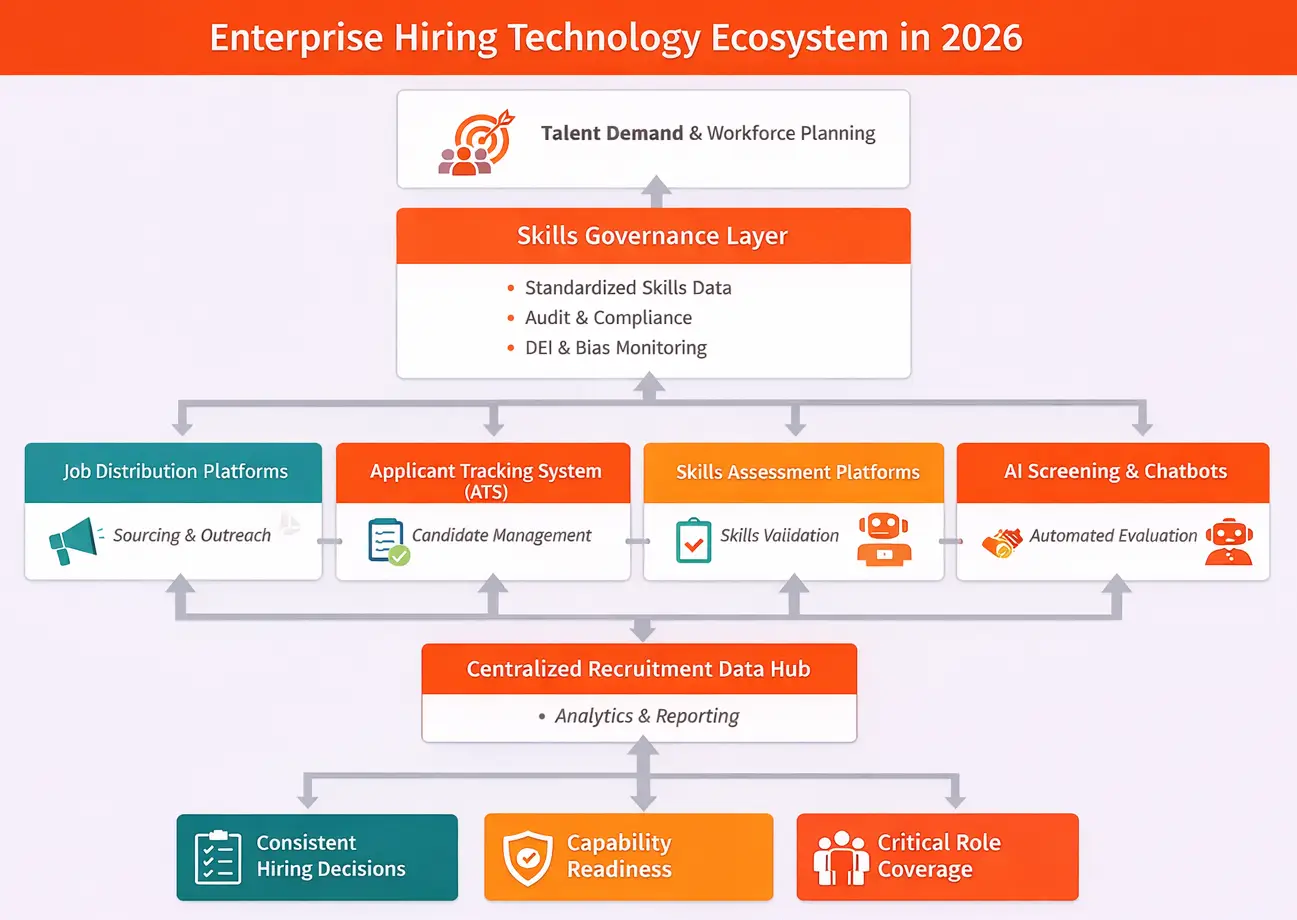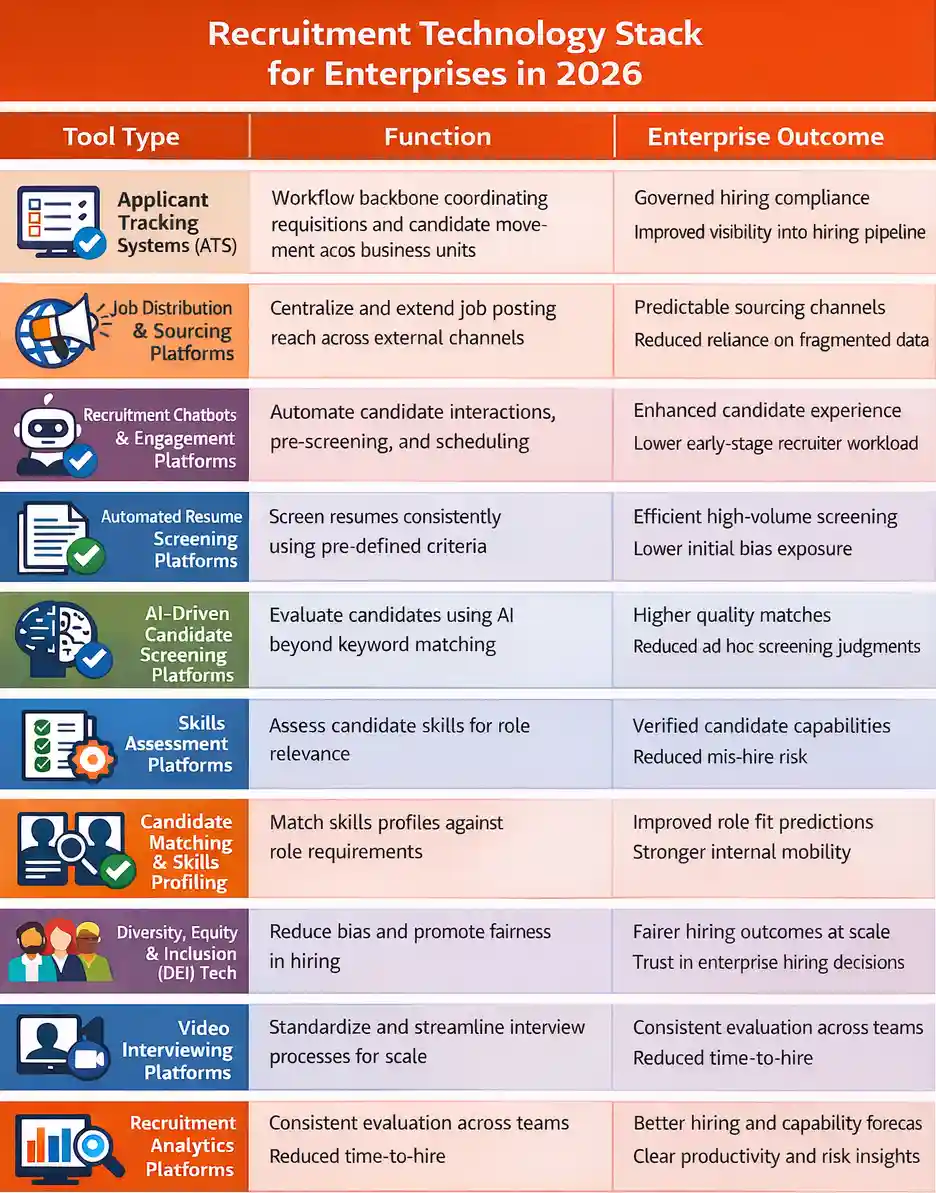Hiring at enterprise scale in 2026 is no longer constrained by sourcing alone. The core challenge is governing hiring decisions across thousands of roles, multiple geographies, and interconnected HR systems while maintaining consistency, fairness, and business continuity.
For organizations operating across 5,000+ employees, recruitment outcomes directly influence delivery stability, critical role coverage, and long-term capability readiness. Fragmented hiring workflows, inconsistent screening standards, and limited visibility into real skills increase risk, especially during periods of transformation or restructuring.
Recruitment technology now functions as an enterprise operating layer. It enables standardized decision-making, governed skills data, and alignment between talent acquisition and workforce transformation priorities.
Recruitment technology as an enterprise operating layer
At enterprise scale, recruitment technology is not a collection of isolated tools. It operates as an integrated layer connecting sourcing, screening, skills validation, and analytics across ATS, assessment platforms, CRM systems, and HCM environments.
Its purpose is to convert hiring activity into decision-grade workforce data. This allows enterprises to assess capability readiness, protect business continuity, and reduce reliance on subjective or inconsistent hiring signals.
When implemented correctly, recruitment technology supports governance, auditability, and long-term workforce agility, not just transactional hiring efficiency.
To understand how recruitment technology operates as a unified enterprise layer, see the ecosystem overview below.

This model highlights how standardized skills governance, integrated systems, and centralized data hubs collectively drive consistent hiring decisions and workforce readiness at scale.
Why recruitment technology breaks at enterprise scale without skills governance
Recruitment processes that work for smaller organizations often fail at enterprise scale. Without centralized skills intelligence and governance, enterprises face inconsistent screening outcomes, limited audit trails, and increased bias exposure across regions and business units.
Common failure points include reliance on self-reported skills, disconnected screening tools, and an inability to validate hiring decisions during audits or workforce reviews. Over time, these gaps weaken hiring quality, internal mobility, and transformation readiness.
Skills-governed recruitment technology addresses these risks by standardizing how skills are defined, measured, and applied across the hiring lifecycle.
To understand how recruitment technology operates as a unified enterprise layer, see the ecosystem overview below.
This model highlights how standardized skills governance, integrated systems, and centralized data hubs collectively drive consistent hiring decisions and workforce readiness at scale.
Core recruitment technology categories enterprises prioritize in 2026
As hiring volumes and role complexity increase, enterprises prioritize recruitment technologies that integrate with existing HR ecosystems, scale consistently across regions, and support governed decision-making.
Below are the ten recruitment technology categories enterprises rely on in 2026, rewritten through an enterprise operating-model lens.

1. Applicant Tracking Systems (ATS)
Applicant Tracking Systems act as the workflow backbone for enterprise hiring, coordinating requisitions, candidate movement, and stakeholder collaboration across business units.
Enterprise deployment considerations
- Integration with assessments, skills intelligence platforms, and HCM systems
- Standardized workflows across geographies and hiring teams
- Data consistency to support reporting and audits
Decision outcomes enabled
- Improved hiring process governance
- Reduced operational risk from inconsistent workflows
- Better visibility into hiring pipeline health across the enterprise
2. Job distribution and sourcing platforms
Job distribution platforms extend enterprise hiring reach across external channels while centralizing sourcing data for analysis and optimization.
Enterprise deployment considerations
- Consistent employer branding across regions
- Channel performance visibility at scale
- Integration with ATS and analytics layers
Decision outcomes enabled
- More predictable sourcing performance
- Improved workforce demand forecasting
- Reduced dependency on fragmented sourcing channels
3. Recruitment chatbots and candidate engagement platforms
Candidate engagement platforms support high-volume enterprise hiring by standardizing communication, pre-screening, and scheduling interactions.
Enterprise deployment considerations
- Governance of candidate communication standards
- Integration with ATS and screening workflows
- Data capture for downstream analytics
Decision outcomes enabled
- Improved candidate experience at scale
- Reduced recruiter workload without quality loss
- Consistent early-stage screening across regions
4. Automated resume screening platforms
Automated resume screening platforms help enterprises manage high application volumes by applying consistent criteria during early screening stages.
Enterprise deployment considerations
- Transparency in screening logic
- Bias monitoring and auditability
- Alignment with skills-based hiring standards
Decision outcomes enabled
- Faster initial screening without manual overload
- Reduced variability in shortlisting decisions
- Lower bias exposure in early hiring stages
5. AI-driven candidate screening platforms
AI-driven screening platforms evaluate candidates using structured data points beyond keywords, including skills alignment and experience patterns.
Enterprise deployment considerations
- Explainability of AI-driven recommendations
- Validation of screening criteria against role requirements
- Ongoing governance to monitor adverse impact
Decision outcomes enabled
- More consistent candidate shortlisting
- Improved role fit and hiring accuracy
- Reduced reliance on subjective screening judgments
6. Skills assessment platforms
Skills assessment platforms provide enterprises with validated signals of candidate capability, replacing assumptions based on resumes, credentials, or job titles.
Enterprise deployment considerations
- Integration with ATS and hiring workflows
- Validation standards for role-relevant assessments
- Governance controls to ensure fairness and auditability
Decision outcomes enabled
- Improved capability readiness for critical roles
- Reduced mis-hire risk through objective validation
- Stronger alignment between hiring and future workforce needs
Skills intelligence platforms such as iMocha support this model by combining skills validation, inference, and analytics to enable skills-first hiring decisions at enterprise scale.
7. Candidate matching and skills profiling platforms
Candidate matching platforms compare structured skill profiles against role requirements to support skills-based hiring decisions.
Enterprise deployment considerations
- Standardized skill taxonomies across roles
- Integration with assessments and workforce planning systems
- Governance over skill definitions and updates
Decision outcomes enabled
- Improved role alignment and readiness
- Increased internal and external talent mobility
- Reduced dependency on traditional credentials
8. Diversity, equity, and inclusion technology
DEI-focused recruitment technologies help enterprises monitor fairness and reduce bias across hiring processes.
Enterprise deployment considerations
- Adverse impact analysis across regions
- Audit trails for screening and selection decisions
- Alignment with enterprise DEI governance frameworks
Decision outcomes enabled
- Fairer hiring outcomes at scale
- Reduced compliance and reputational risk
- Stronger trust in enterprise hiring decisions
9. Video interviewing platforms
Video interviewing platforms enable enterprises to standardize interview processes across distributed hiring teams.
Enterprise deployment considerations
- Structured interview frameworks
- Governance over AI-based analysis features
- Integration with ATS and evaluation workflows
Decision outcomes enabled
- Faster screening without geographic constraints
- More consistent evaluation across interviewers
- Reduced operational costs for large-scale hiring
10. Recruitment analytics platforms
Recruitment analytics platforms consolidate hiring data to support workforce planning and strategic decision-making.
Enterprise deployment considerations
- Data consistency across systems
- Alignment with workforce and skills analytics
- Executive-level reporting frameworks
Decision outcomes enabled
- Clear visibility into hiring performance and risk
- Better alignment between hiring and transformation goals
- Improved long-term workforce planning accuracy
Enterprise outcomes enabled by recruitment technology
When recruitment technology is implemented as an enterprise operating layer, it enables outcomes beyond faster hiring cycles.
Key enterprise outcomes include:
- Improved time-to-productivity through role-relevant skill validation
- Higher critical role coverage during periods of change
- Reduced capability gap exposure across business units
- Stronger internal mobility pipelines supported by consistent skills data
- Lower attrition risk driven by improved role fit and readiness
Enterprise metrics used to evaluate recruitment technology impact
At enterprise scale, recruitment technology performance is evaluated using workforce and capability metrics, not transactional hiring statistics.
Common enterprise metrics include:
- Skill readiness index
- Time-to-productivity
- Critical role coverage
- Capability gap exposure
- Internal redeployment rate
- Attrition risk by skill cluster
These metrics allow enterprises to link recruitment outcomes directly to workforce transformation and business resilience.
Governance requirements for enterprise recruitment technology in 2026
Enterprises require recruitment technology that supports governance at scale. This includes auditability, validation standards, and data accuracy.
Key governance requirements include:
- Validated skills signals instead of self-reported data
- Audit trails for screening and selection decisions
- Bias monitoring and adverse impact analysis
- Data lineage across ATS, assessments, and analytics
- Change management processes to ensure adoption
Without these controls, recruitment technology increases operational and reputational risk rather than reducing it.
Also check out the top 15 enterprise recruitment software redefining modern hiring with advanced features and scalable integrations.
Conclusion
Recruitment technology in 2026 plays a central role in how enterprises manage capability readiness and workforce risk. When aligned with skills intelligence and governance principles, it enables consistent, defensible, and scalable hiring decisions.
Skills intelligence platforms such as iMocha support this approach by acting as a decision-enabling layer that connects skills validation, inference, and analytics to enterprise hiring workflows. This allows talent acquisition leaders to align hiring outcomes with long-term workforce transformation goals.
FAQs
How do enterprises govern recruitment technology across multiple HR systems?
Enterprises govern recruitment technology by establishing a skills intelligence layer that integrates with ATS, assessment platforms, and HCM systems. This ensures consistent skill definitions, validated signals, and auditable decision trails across regions and business units.
What risks do enterprises face without skills-governed recruitment technology?
Without skills governance, enterprises face inconsistent screening decisions, increased bias exposure, limited auditability, and higher mis-hire risk. Over time, this reduces capability readiness and weakens internal mobility and workforce planning initiatives.
How does recruitment technology support enterprise workforce transformation?
Recruitment technology supports transformation by aligning hiring decisions with capability frameworks, future role requirements, and workforce planning data. This ensures hiring contributes to long-term readiness, not short-term requisition fulfillment.
What role does skills intelligence play in enterprise hiring decisions?
Skills intelligence provides validated, decision-grade data on candidate capabilities. Enterprises use this data to standardize hiring decisions, improve critical role coverage, and reduce reliance on subjective or self-reported information.


.avif)
.webp)

.webp)


